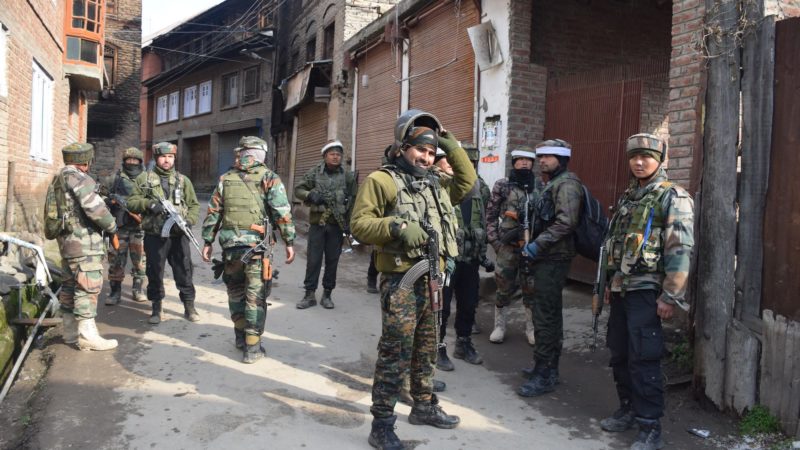
There is a human rights catastrophe unfolding in Kashmir requiring the immediate attention of the British government, the Labour Party and the international community. So far, the response from Britain, with its historic colonial ties to India and Pakistan, and its status as a country that is home to the largest Kashmiri diaspora in the world, is woefully irresponsible, inadequate and dangerous.
The British government has a duty of care to Kashmir but is missing in action, despite there being 500,000 plus British Kashmiris living here, with roots in Kashmir and Pakistan-administered Kashmir, such as my family. Many British people with Kashmiri heritage are terrified about the safety of their families and loved ones. We are worried about what unfolding events in Kashmir mean for Kashmir’s future, relations between nuclear-armed India and Pakistan, and the wider stability of the region.
Last Friday, the Narendra Modi government in India deployed a reported 38,000 heavily armed Indian troops to Kashmir to add to the existing 700,000 Indian soldiers already inside Kashmir. Even before Friday’s massive military build up, Kashmir was already one of the most militarised places in the world. Kashmiris continue to be subjected to enforced disappearances, torture, rape and, in recent years, deliberate blinding by Indian troops firing pellet guns into the eyes of protestors, many of whom have been school children and university students, leaving them blind.
Kashmir’s population of seven million people is under curfew and the region is in lockdown. The Modi government, in a move straight out of the Arab Spring dictators’ handbook, has imposed a complete communications and media blackout across the territory, with the internet and phone lines cut. Kashmiris have been put under curfew and Kashmiri politicians, academics and prominent political and public figures have been bundled into jail with no due process. Over the past six days, India has orchestrated a coup in Kashmir and is now overseeing a military occupation of a territory and a people offered protection under international law. This is as brazen as it gets.
Then, on Monday, things took an even more dangerous and disastrous turn with the Indian government suddenly and without warning revoking Article 370 of the Indian constitution. This means the disputed territory of Kashmir has lost many aspects of its autonomy, including the right to be seen a state separate of India, with its own flag and laws. The move by India violates the country’s own constitution, international law, and the UN resolution covering disputed Kashmir.
The radio silence from the British government and the Foreign Office simply won’t do, with either one yet to make a statement recognising India’s role in disregarding international law and annexing disputed international territory and putting seven million Kashmiris at risk of even graver human rights violations.
The consequences of India’s occupation of Kashmir first and foremost impacts Kashmiris. But it will also have very real implications for the relationship between India and Pakistan, and impact any attempts to negotiate peace in neighbouring Afghanistan and the stability of the wider region. The current situation will also have a profound effect on the safety and wellbeing of the Muslim minority in India, who are already subject to extremist hate including lynchings driven by Islamophobia and the resurgence of extremist Hindu nationalism – directly connected to the rhetoric, actions and policies of the Modi government. India’s 195 million Muslims are widely regarded as second-class citizens by right-wing Hindu nationalists. The occupation of Kashmir is pouring petrol onto a region engulfed in conflict, extremism, human rights violations and displacement.
India, often dubbed the “world’s biggest democracy”, has in Prime Minister Narinda Modi and the ruling Bharatiya Janata Party (BJP) appointed one of the most far-right and extremist nationalist governments in the world. It is, without a doubt, one of the most right-wing Hindu nationalist governments in India’s history. Over the past year, democracy in India has been weakened with attacks on politicians, journalists, writers, the judiciary and anyone who dares to criticise the politics of extreme nationalism, bigotry and the far right.
The Labour Party’s response so far to this crisis has been disappointing. Liz McInnes, shadow foreign minister, issued a tweeted statement on Tuesday and then a letter to Foreign Secretary Dominic Raab. These failed to mention that Labour – as a government in waiting – acknowledges Kashmiris have a right to self determination, enshrined in international law, and that Labour stands in solidarity with Kashmiris in their struggle for a homeland.
Labour must push the government and the Foreign Office to condemn the Indian government for its flagrant disregard of international law and for occupying Kashmir. Labour must call for independent human rights observers to be sent to Kashmir. Labour must pressure the Indian government to immediately lift the occupation and curfew of Kashmir, release all those arrested and put under house arrest with no due process.
Labour should also demand an immediate suspension of all British arms sales and arms components to India. In the words of Labour MPs and shadow cabinet members such as Yasmin Qureshi, Shabana Mahmood, Rushnara Ali and Rosena Allin-Khan, Britain must put principle before Britain’s trade relationship and speak up for Kashmiri people. Britain has a historic duty to resolve this seven-decade crisis.


More from LabourList
Andy Burnham manifesto: Greater Manchester mayor reveals three key election pledges in bid for third term
‘Labour should grasp the chance to secure EU visa deal for young workers’
‘How Labour could win a Milton Keynes majority for the first time in decades’